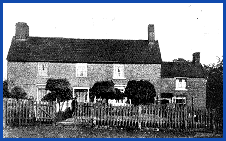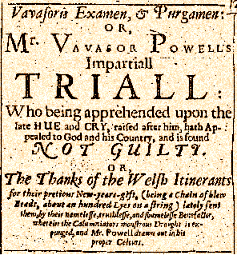
The beginnings of dissent
Vavasor Powell (1617-1670)
According to his enemies, he was the son of an innkeeper and oatmeal dealer of Knucklas in Radnorshire. He worked for a while as an hostler at Bishops Castle before being sent by his uncle, the vicar of Clun, to Oxford University. Vavasor, however, dropped out to become a schoolteacher at Clun.
He first married a widow, Mrs Quarrell of Presteigne, and after her death married Katherine, the daughter of General Gilbert Gerard. Probably influenced by puritan thinking at Oxford, he became an itinerant preacher around 1638-9.
Goetre, Kerry
Photograph by kind permission of the Powysland Museum
 Purge
of the clergy
Purge
of the clergyHe became pastor of Newtown, and built a house at Goetre in Kerry. With the 1650 Act for the Propagation of the Gospel in Wales, he was one of 25 Approvers who advised the commissioners, being very active in replacing clergy for alleged incompetence and substituting puritans. He caused the rectors of New Radnor, Gladestry, Cascob, Cefnllys and Llandegley and the vicar of Llanbadarn-fawr to be deprived of their benefices between 1650 and 1653.
 Arrest
and imprisonment
Arrest
and imprisonmentAt about this time, Alexander Griffith, who had been expelled from his living at Glasbury for "drunkenness and lasciviousness", published the vituperative pamphlet, Hue and Cry after Vavasor Powel. Powell was arrested at the Restoration and released the same year. He continued to preach, was arrested several times, and was then imprisoned for rejecting the oath of supremacy. He was committed to the Fleet Prison between 1660 and 1662, and to Southsea Castle from 1662-67. After the fall of Lord Clarendon he obtained his release in November1667, but was arrested on a preaching tour in October 1668 and was returned to the Fleet Prison, where he died.